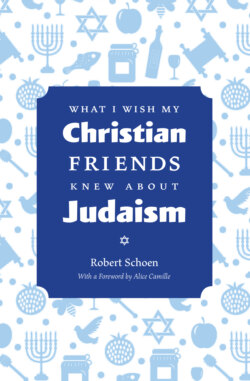Читать книгу What I Wish My Christian Friends Knew about Judaism - Robert Schoen - Страница 7
На сайте Литреса книга снята с продажи.
ОглавлениеForeword
by Alice Camille
Dr. Robert Schoen and I met cute. I needed new glasses; he was the optometrist who provided them. In the course of the eye exam, I mentioned that I’m a writer. Immediately Bob produced an unpublished manuscript from a nearby cabinet, its printed pages neatly filling a ream box. The title was brilliant: What I Wish My Christian Friends Knew About Judaism. I had no doubt this book a) would be published, and b) should be read.
Taking the box home, I absorbed his chapters on my sofa. Once more, Bob improved my vision. Here I encountered the man I’d already met during the eye exam: pleasant-mannered, thoughtful, funny, sincere. I’d written books introducing Catholicism to the curious, so this genre was familiar territory: How to explain to outsiders the contents of your own heart? How to present what may seem strange so that it’s demystified—without losing its sacred character?
Bob’s approach is an invitation to that kind of conversation. He explains what it means to be Jewish and all the ways one might find oneself inside that rather expansive box. He offers plain and simple tidbits of history, belief, practice, and custom. As a Jewish man, alert to many aspects of Christian practice, he’s able to comfortably connect the dots and offer comparisons of concepts we share like confirmation, confession, priesthood, and liturgy. An avid student of Scripture myself, I was grateful for the chance to see the longer part of my Bible from his astute, and often wry, perspective.
Reading What I Wish ... has been the invitation to many more conversations since. Bob and I dove into our own Jewish-Catholic dialogue, one dynamic lunch at a time. In our enthusiasm for what we were discovering, we decided to take the conversation public, staging a dialogue Bob artfully entitled “Bob and Moses and Jesus and Alice.” Movie fans may appreciate the reference. We threw down an area rug, provided two easy chairs and a pole lamp as stage props. We tried to give the show a parlor-chat feel.
What we discovered that night, and on other occasions since, is how vast the chasm of unknowing between religions can be. Never mind that Christianity is to Judaism as the United States is to England. No matter our differences, we share a history that will always bind us together. But as Bob points out, it’s a mistake to imagine that the Jewish person you’re talking to knows the story of Jesus. Most Jews have never read what Christians call the New Testament. They have no knowledge of the gospels or Saint Paul. They only know the pogroms and persecutions of history Jews suffered in so-called Christian nations. The most urgent question many Jews have for Christians often is: What are your views about the nation of Israel?
In the same way, many Christians have only the sketchiest notion of what’s in our Old Testament: something about Adam and Eve, Noah’s ark, Ten Commandments, and a Promised Land. They may know next to nothing about what goes on in a synagogue or what a believing Jew actually believes. The main question Christians have in a Jewish-Christian dialogue inevitably is: Why don’t Jews believe in Jesus?
Both questions harbor a bit of defensiveness, and can seem accusatory. We still have a long way to go just to hear each other; then farther toward acceptance; until we finally creep into the territory of a long-overdue embrace. The twenty-first century needs more folks dedicated to reaching across differences, however prolonged and deeply maintained, to genuine understanding. This book can be the first step for its readers into that kinder, better world.
